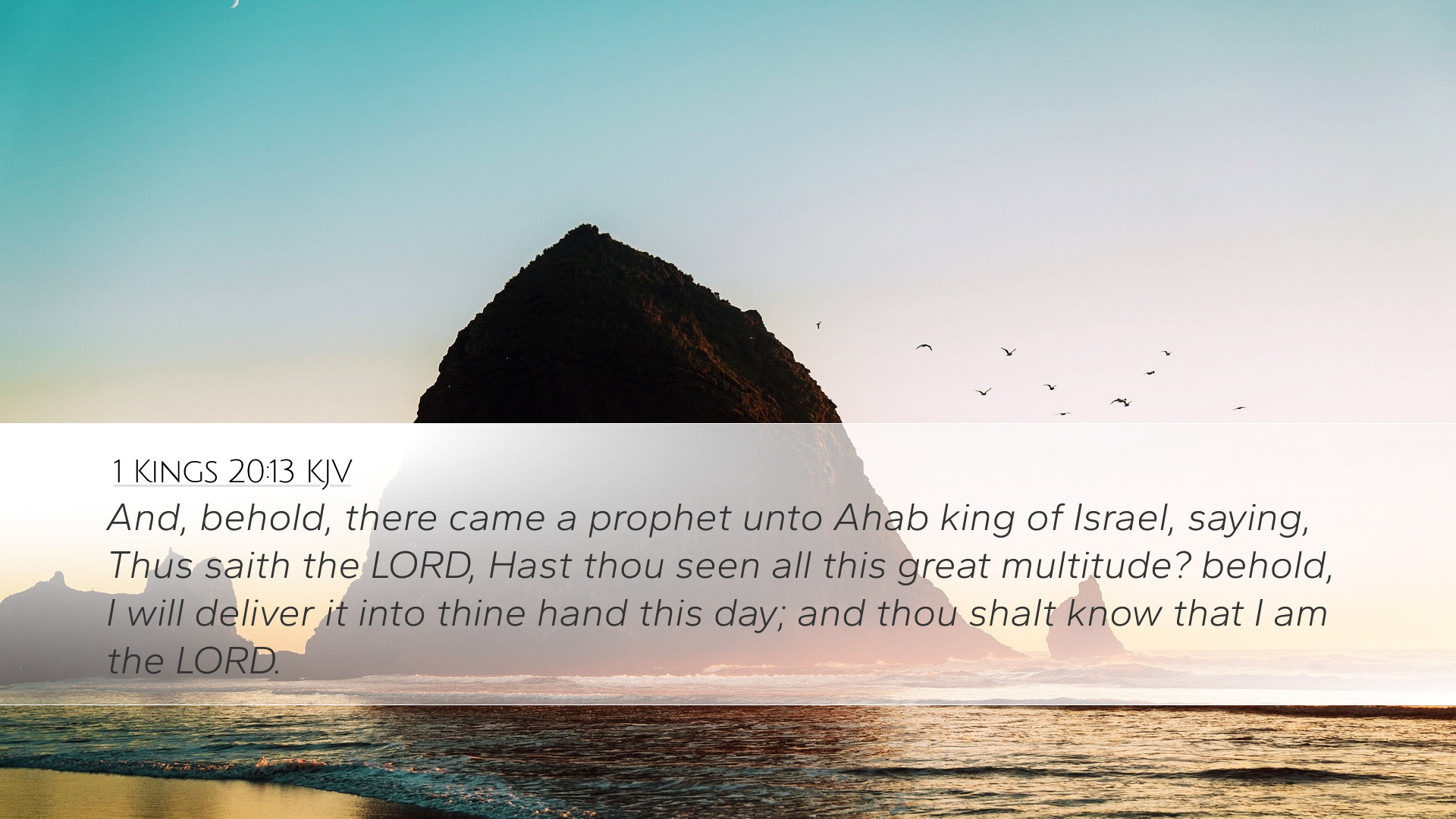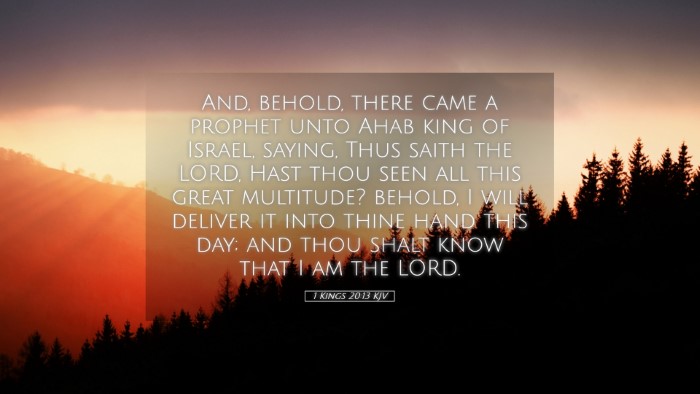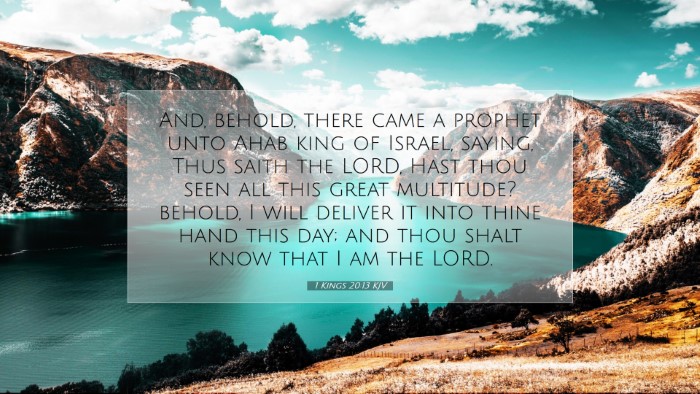Commentary on 1 Kings 20:13
Verse Context: 1 Kings 20:13 states, "And, behold, a prophet came near unto Ahab king of Israel, saying, Thus saith the LORD, Hast thou seen all this great multitude? behold, I will deliver it into thine hand this day; and thou shalt know that I am the LORD."
Introduction
This verse marks a pivotal moment in the narrative of the confrontation between King Ahab of Israel and Ben-Hadad, the king of Aram. The announcement from the prophet illustrates God's sovereignty and His willingness to intervene on behalf of His people, despite Ahab's previous moral failures. The significance of this verse lies in its reflection of God's grace and the theme of divine deliverance that resonates throughout Scripture.
The Prophet’s Role
Matthew Henry emphasizes the role of the prophet as a divine messenger who brings hope to Ahab amidst the looming threat of the Aramean army. This highlights the continual presence of God's voice in times of crisis. Ahab's desperation is met with a promise from God, indicating that God does not abandon His people, even those who have strayed.
Albert Barnes adds that the prophet's arrival signifies God's initiative in the situation. The announcement is not merely a prediction but a declaration infused with the authority of God. It suggests that Ahab, despite being a flawed king, is a part of God's plan and that God has not given up on him.
The Importance of God’s Assurance
This verse underscores a crucial theological theme: God's readiness to deliver His people. Adam Clarke interprets this as an affirmation of God’s might and power over the multitude of adversaries. The phrase "behold, I will deliver it into thine hand" serves as both a promise and a challenge to Ahab's faith.
God wants Ahab to recognize that victory does not rest on military strength but on divine providence. This reflects the biblical principle that salvation and deliverance come from the Lord, a theme found throughout the prophetic literature. Ahab must now understand that his strength lies not in his own capabilities but in submission to God’s will.
Divine Intervention
This declaration of divine deliverance is a pivotal confirmation for Ahab. According to Matthew Henry, it illustrates God’s ability to turn the tides of battle and bring victory against overwhelming odds. This confrontation with Ben-Hadad serves both as a test and as a manifestation of God’s power.
Barnes points out that God's promise of victory despite the odds demonstrates His sovereignty. The multitude that threatens Ahab symbolizes the powerful forces that oppose God's people throughout history. Yet, God reassures Ahab that He is not intimidated by these earthly armies.
God's Purpose Revealed
God's desire for Ahab to "know that I am the LORD" is crucial. Adam Clarke notes that this phrase calls for acknowledgment of God's authority and presence. The entire episode serves as a lesson for Ahab, urging him to recognize that only through God can he achieve true success and avoid impending doom.
This moment becomes a reminder of the intimate relationship between faith and recognition of God's hand in one's life. Ahab must transition from a reliance on his strength to an understanding that his identity and power are entwined with God’s purpose.
Pastoral Applications
- Faith in Crisis: Pastors can illustrate the importance of reliance on God during crises. Ahab’s story provides a context where faith is essential when facing overwhelming challenges.
- God's Grace: This passage can serve as a foundation for discussing God's grace, showing that His forgiveness and interventions are available even to those with a troubled past.
- Divine Sovereignty: The commentary encourages understanding that God’s sovereignty extends to our lives. Leaders and congregants alike are encouraged to trust in God's plans and purposes, irrespective of visible circumstances.
- Call to Acknowledge God: The call for Ahab to recognize God's authority is pivotal. This can be a transformative message for congregants, encouraging active acknowledgement of God's role and presence in their lives.
Theological Reflections
This verse stimulates critical reflection on the themes of redemption, divine sovereignty, and human responsibility. Ahab’s experience reflects the broader biblical narrative where God intervenes in human affairs to reveal His glory and encourage faith.
The reassuring proclamation from the prophet serves as a reminder that God remains actively involved in the lives of those He loves. The dependence on divine authority, especially in moments of fear and uncertainty, remains a relevant message for contemporary believers seeking direction and assurance.
Conclusion
The narrative surrounding 1 Kings 20:13 offers rich insights into God’s character and His relationship with His people. Through the assurance given to Ahab, we see a glimpse of the overarching theme of God's grace and intervention in times of trouble. This commentary aims to enrich the understanding of pastors, students, theologians, and scholars by providing a multi-faceted exploration of how God's promises and sovereignty reveal His enduring faithfulness to His people.


